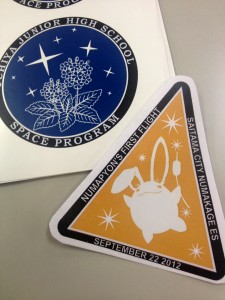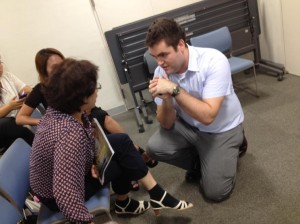 by Matt Shannon
by Matt Shannon
For the iTDi ‘From the Teacher’s Family’ issue, I’ve interviewed my partner of seven years, Rieko, and her college-aged son, Yudai. We have all lived together about five years now. I used the questions supplied by iTDi and while the interview didn’t go astray, I did find the answer to be surprising.
Matt: What are some good things about having a partner who is a teacher?
Rieko: Positive points? I can think of some negative points. Positive points…you have summer vacation off, kind of. And spring vacation…sometimes. You get school lunch. I’m sorry, I can’t think of anything positive right now.
Yudai: When I was working as a tutor, I was able to ask you for help about grammar points. But more so, how to treat people and problems with respect, how to engage someone who wants to be taught without being “their teacher.” I also liked that we could have the same day off. I mean, Saturday and Sunday. There’s some jobs in which you have work Sunday-Monday, or worse, the entire weekend. [Author’s note: I now work a Tuesday to Saturday workweek].
Matt: Were there ever moments in your life when you wished I wasn’t a teacher?
Rieko: Not all the time! But teachers are so restricted. You’re not allowed to tell people what you think, can you? You have to be very careful. You have to sign a contract saying you won’t say anything bad about the government, and really it’s not a very good system, so you must be very conflicted about that. [Author’s note: in Saitama City where I live, we have to sign a pledge that we will not work or be a part of any group which stands to undermine or threaten the Japanese government.] You can’t travel or take time off easily, you can’t get too drunk, you can’t be too wild. Teachers are so influential to students or other people, so you should be a teacher, a model, all the time.
Matt: Was there ever a moment when you were proud of something I did as a teacher?
Rieko: I don’t know how to answer this. You’ve done so much curriculum work; spent so many hours, Saturdays and Sundays, on vacation, always thinking about school, how to teach classes best – what should be and shouldn’t be. I am so proud of that. You made passports [author’s note: special student self-assessment tools]; the time you actually made a town built out of blocks of students’ conversations which showed what was important to them. And then there was the time you made that giant mural with the students, and the green curtain. I’m proud of you. You did things. I don’t know how to make that sound better. You did things with your students.
Matt: How do you think me being a teacher has made life more complicated for you?
Rieko: Your eye level, part of it is always at the kid’s level. I mean that both ways. When I’m talking with you, I feel like I am talking with several different people. I don’t always feel your honest opinion on some things because you’re carrying all of these different perspectives inside your heart.
You always work too hard. Sometimes my job is easy, but you always have five or seven hours of too much work. We can’t share time, and I don’t like it. You work forever and don’t get paid anything extra. And if you do work only the contract hours, they’ll bully you and say you work below your ability. It’s a terrible system. You don’t really know your boss, so they don’t have to be honest with you, and they don’t give you a chance. They keep cutting your salary and making excuses. There are so few positions, so you have to hold on to terrible jobs.
Matt: Do you think I am well suited to be a teacher? Why?
Rieko: In the classroom, you keep your face to students. You’re very good at that – they feel that come off you and the atmosphere is about their interest, not yours. You can grab a topic off of the students and play with it. You have to do that, I guess. And then you can drop the idea you wanted to show them into the students’ context so they can take it home.
You have the most energy of people I know, but it’s not enough and I am worried about how long you can keep it up. You can make students happy, but can you make yourself happy? Your expectations are multiple because of your students. You can’t stop it, so that makes you both stronger than normal but more responsible than you need to be.
Yudai: You’re friendly, you talk to people well. You can build a good relationship between you and your students. Also, you are kind of young. I mean, you know many things which young people like. You’re not dead yet.
Matt: Why do you think I became a teacher?
Rieko: I think you like teaching. Not a teacher’s job, but teaching.
Matt: How would our lives change if I stopped being a teacher tomorrow?
Yudai It’s hard to guess until after payday. Honestly, I can’t imagine. But, harder for sure. [Author’s note: If I quit my job tomorrow, I would be deported sometime in August unless I found another job]
Rieko: … [Author’s note: in the end, Reiko did not answer this question]






